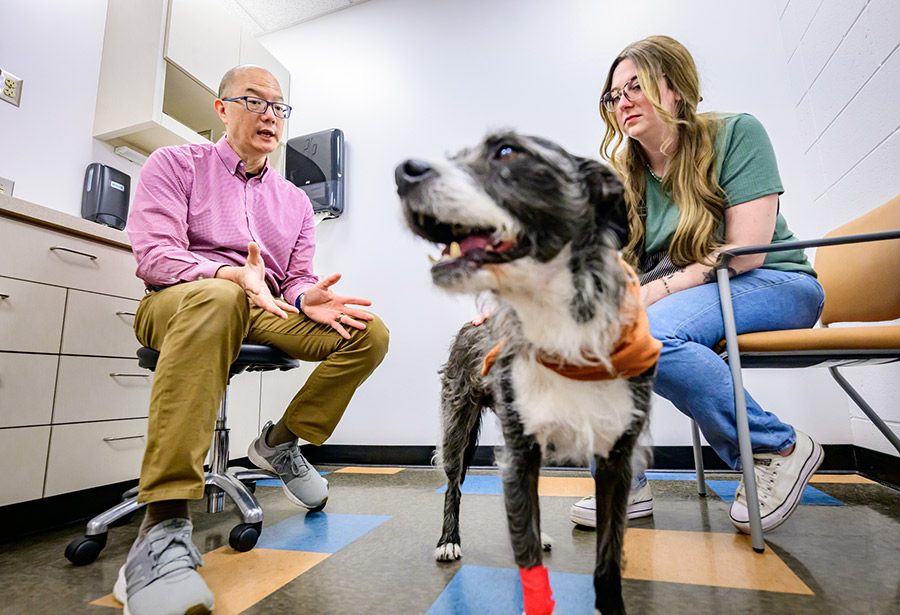We welcome undergraduate researchers
As an R1 university—one that grants doctoral degrees and is engaged in “the highest research activity”—Illinois has always included undergraduate students in research, and the emphasis on undergraduate research is growing. The College of Veterinary Medicine, although it does not offer undergraduate degrees, engages dozens of undergraduate students from a variety of majors in research activities.
Dr. Lois Hoyer, associate dean for research and advanced studies at the veterinary college, has worked to expand the connections between college researchers and the undergraduate population. One way she promotes these connections is by serving on the advisory board for the Office of Undergraduate Research (OUR).
Campus Programs Provide Connections
“OUR is the clearinghouse for activities such as helping researchers find interested undergraduate students and providing seed grants to help grow campus undergraduate research programs,” says Dr. Hoyer.
OUR also celebrates undergraduate research efforts on campus through an annual symposium. The photo above shows Hajera Afreen, a pre-med sophomore in Molecular and Cellular Biology (MCB) who conducts research in the laboratory of Dr. Jing Yang, comparative biosciences. Afreen was selected to give a featured presentation at the 2018 Illinois Undergraduate Research Week Symposium on April 19 at the Illini Union.
Another campus program that actively involves veterinary college faculty is The Researchers Initiative. Directed by Dr. Lydia Khuri, this program connects students from University Housing Living-Learning Communities with research opportunities and programming.
Many Majors Welcome
Specific course rubrics in each of the three veterinary college departments allow undergraduate researchers to earn academic credit. These courses have long been offered in the Departments of Pathobiology and Comparative Biosciences; this past year the Department of Veterinary Clinical Medicine established one through an initiative spearheaded by Dr. Annette McCoy.
![[Marta Rzadkowska with a turtle]](https://vetmed.illinois.edu/wp-content/uploads/2021/04/news-martarad-turtle-169x300.jpg)
“A number of MCB students seek undergraduate research opportunities outside MCB laboratories and mentors, and we support these opportunities for our students,” says Dr. Brenda Wilson, associate director of undergraduate education for MCB. “Vet Med faculty members provide high-quality research opportunities for MCB students, who go on to pursue a broad variety of biomedical careers.”
Research Experiences Open New Paths
Dr. Paul Eubig, comparative biosciences, employs undergraduates as well as graduate and veterinary students in his laboratory, which uses neuroscience techniques to answer toxicology-related questions. He says one of his favorite parts of working with undergraduates is seeing the sometimes unexpected paths their studies and careers take.
“Occasionally, it is clear that their time in the lab influenced their decisions,” says Dr. Eubig.
He points to a chemistry major who later entered a PhD program in toxicology at North Carolina State University. “I know that she had no idea what toxicology was before joining our lab,” he says.
Another undergraduate in Dr. Eubig’s lab, who majored in MCB and psychology, landed a position at the National Institutes of Health after graduating, in large part because the researcher who hired him “does work similar to ours and wanted someone familiar with the field.”
Opportunities at a Critical Stage
Dr. Eubig says, “I enjoy seeing the undergrads growing professionally, gaining new skills, and becoming more confident in their work and in presenting their work.”
He strongly believes in giving his students opportunities to present their research in order to develop critically important communication skills. “Vet Med Research Day provides an excellent opportunity for undergrads in our lab to present their research in a relatively low-stress environment,” he notes.
Whatever the route that brings them to the veterinary college, undergraduate students interested in research will find a warm reception.
“The college looks forward to welcoming even more undergraduate researchers,” says Dr. Hoyer, “and building even stronger links to the campus biomedical research community by providing these training opportunities at a critical stage in career development.”

![[Hajera Afreen presents at Undergraduate Research Week Symposium]](https://vetmed.illinois.edu/wp-content/uploads/2021/04/news-HajeraAfreen.jpg)


